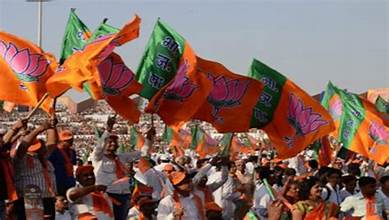The state of Uttar Pradesh is bracing itself for a significant upheaval as the Rajya Sabha elections draw near, with an intense power play between the BJP and the SP alliance on the horizon. In the midst of this political turmoil, the role of smaller parties is expected to be crucial, with several of them already showing signs of defiance. Additionally, discontent among some leaders within the Samajwadi Party is adding to the party’s woes.
BJP-Samajwadi Alliance Dynamics
According to sources, there is growing dissatisfaction among key figures within the Samajwadi Party, notably Om Prakash Rajbhar, the chief of Suheldev Bharatiya Samaj Party. Allegedly, Rajbhar is discontented due to the BJP’s failure to fulfill promises, particularly in regards to ministerial positions. If his dissatisfaction escalates, devising future strategies for the BJP alliance could become increasingly challenging. The party’s decision to field Sanjay Seth as the eighth candidate for the alliance with the Samajwadi Party has indeed presented a formidable hurdle. However, the party also perceives this as a challenge in its own right.
Crucial Strategies Moving Forward
Apart from the aforementioned concerns, dissent within the ranks of the Samajwadi Party is growing, particularly voiced by MLA and Kamuruddin Nagar leader Pallavi Patel. Patel has raised questions regarding Akhilesh Yadav’s decisions, refusing to endorse the SP candidate in the upcoming elections. Should this dissent persist, strategizing for the Samajwadi alliance becomes imperative. Sources suggest that several Samajwadi Party MLAs are unhappy with Akhilesh Yadav’s choices.
Challenges and Third-party Dynamics
In addition to Pallavi Patel, Swami Prasad Maurya, another Samajwadi Party leader, has expressed discontent. Maurya’s dissatisfaction has come to light amidst the Rajya Sabha elections. Besides Om Prakash Rajbhar and Pallavi Patel, the role of the third ‘kingmaker,’ RLSP Chief Jayant Chaudhary, is crucial. The support lent by these regional parties will significantly ease the path forward for both alliances. Therefore, formulating strategies and making decisions without their involvement seems unlikely.




